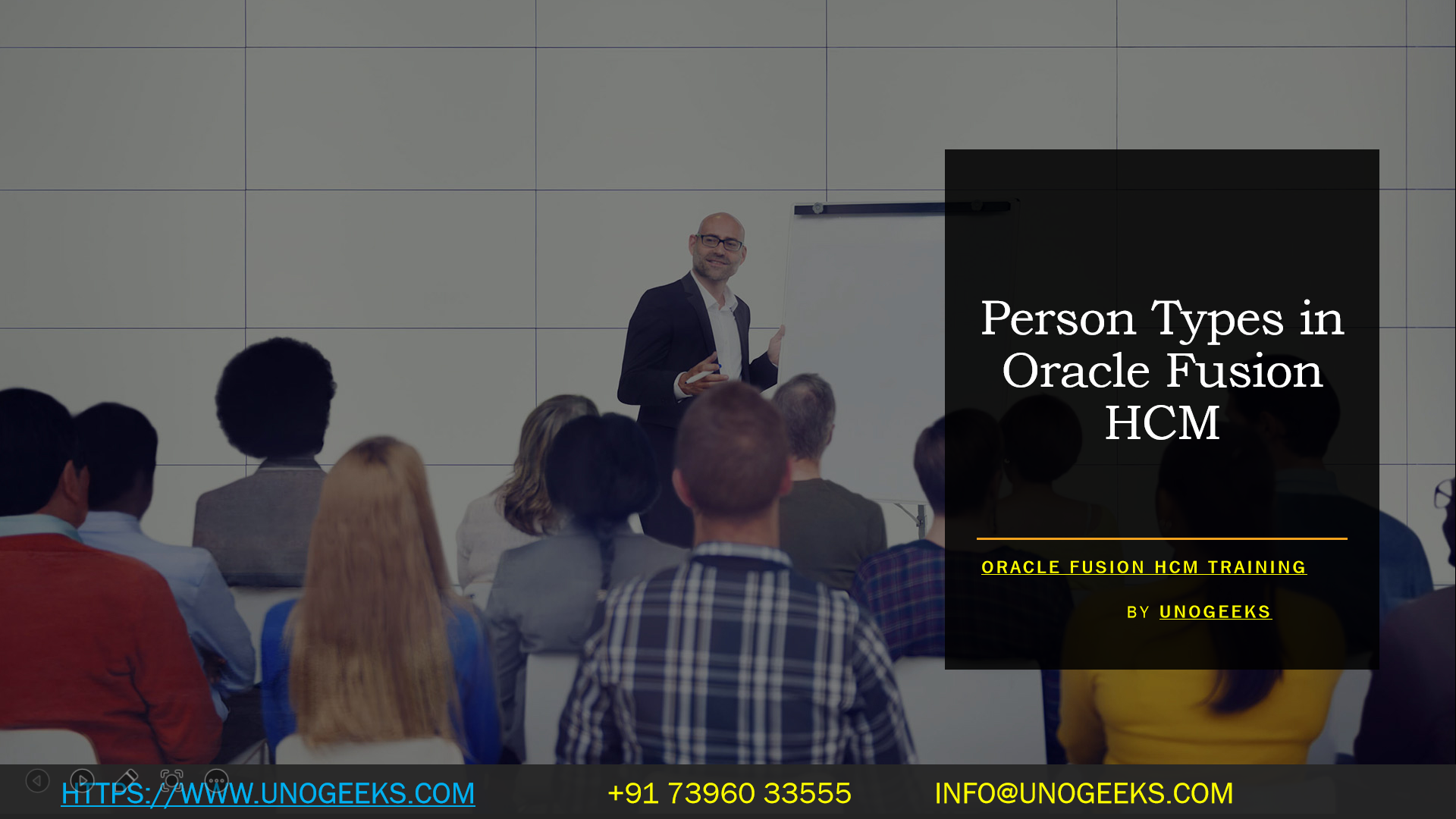Person Types in Oracle Fusion HCM
Oracle does provide trial and practice instances for Oracle Fusion HCM through their Oracle Cloud infrastructure. These practice instances are often part of Oracle Cloud’s “Oracle Cloud Free Tier” offering, which provides limited access to Oracle Cloud services for learning, testing, and development purposes.
Here are the general steps you can follow to access a practice instance of Oracle Fusion HCM:
- Sign Up for Oracle Cloud Free Tier:
- Go to the Oracle Cloud website.
- Sign up for a free Oracle Cloud account if you don’t have one already.
- Verify your account and log in to the Oracle Cloud Console.
- Access Oracle Fusion HCM Practice Instance:
- Inside the Oracle Cloud Console, navigate to the “Marketplace” or “Services” section.
- Search for “Oracle Fusion HCM” or “Oracle Cloud Applications.”
- Look for a “Trial” or “Free” offering of Oracle Fusion HCM.
- Provision the Instance:
- Follow the instructions to provision your Oracle Fusion HCM practice instance.
- You might need to specify details such as the region, domain, and other configurations.
- Access and Practice:
- Once the instance is provisioned, you’ll receive credentials and information on how to access it.
- Log in to the Oracle Fusion HCM instance using the provided credentials.
- You can then explore, practice, and familiarize yourself with the Oracle Fusion HCM environment.
Keep in mind that offerings and availability might change, and Oracle Cloud’s Free Tier might have limitations on usage and duration. Always review the terms and conditions of the Oracle Cloud Free Tier and ensure you understand any associated costs or restrictions.
For the most accurate and up-to-date information on accessing Oracle Fusion HCM practice instances, I recommend visiting the official Oracle Cloud website or contacting Oracle Cloud support . In Oracle Fusion HCM, “Person Types” refer to categorizations that help define different roles or categories of individuals within the system. These person types are used to distinguish between different types of people, such as employees, contingent workers, contractors, and external contacts. Each person type may have distinct attributes and settings based on their role within the organization.
Here are some common person types you might encounter in Oracle Fusion HCM:
- Employee:
- Represents individuals who are regular employees of the organization.
- Typically associated with full-time or part-time employment.
- May have various job roles, positions, and employment details.
- Contingent Worker:
- Refers to individuals who work for the organization on a temporary or contract basis.
- Might include consultants, freelancers, or temporary staff.
- May have different employment terms and benefits.
- Contractor:
- Similar to contingent workers, contractors are individuals hired to perform specific tasks or projects.
- Contractors might be from external companies or firms.
- External Contact:
- Represents individuals who have a business relationship with the organization but are not employees or workers.
- May include vendors, suppliers, partners, or customers.
- Applicant:
- Refers to individuals who have applied for job positions within the organization but have not yet been hired.
- Retiree:
- Represents individuals who were former employees and have retired from the organization.
- Dependent:
- Refers to individuals who are dependents of employees and are linked to employee records for benefits and coverage purposes.
- Student:
- Represents individuals who are students associated with the organization, such as interns or trainees.
Person types help in managing different categories of individuals within the Oracle Fusion HCM system, allowing you to tailor processes, security, and data management according to their specific roles and relationships with the organization. Different person types might have varying data collection requirements, security privileges, and reporting needs.
It’s important to note that the specific person types available in Oracle Fusion HCM may depend on your organization’s configuration and the version of the software you are using. Always refer to the official Oracle documentation for the most accurate and up-to-date information about person types and their usage in Oracle Fusion HCM.
Oracle Fusion HCM Training Demo Day 1 Video:
Conclusion:
Unogeeks is the No.1 Training Institute for Fusion HCM Training. Anyone Disagree? Please drop in a comment
You can check out our Oracle Fusion HCM Training details here Oracle Fusion HCM Training
You can check out our other latest blogs on Oracle Fusion HCM Training in this Oracle Fusion HCM Blogs

———————————-
For Training inquiries:
Call/Whatsapp: +91 73960 33555
Mail us at: info@unogeeks.com
Our Website ➜ https://unogeeks.com
Follow us:
Instagram: https://www.instagram.com/unogeeks
Facebook: https://www.facebook.com/UnogeeksSoftwareTrainingInstitute
Twitter: https://twitter.com/unogeeks
